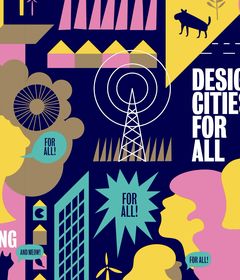The reality of the climate crisis and how it impacts our cities is fundamentally a question of social justice and democracy. A transition towards a climate just future has to be deeply inclusive – that is the big challenge for our democracies. As the risk of a destructive 3+ Degrees temperature rise keeps growing, transitioning together is about the institutional infrastructures that enable systemic change: after all, climate change is not an isolated crisis, but a symptom of a system deeply out of balance. How can we design legitimate and equitable pathways towards a climate-resilient and thriving future?
This triptych aims to explore what this means for our cities, and for us as individuals and communities – and identify some of the core features of a more hopeful future. In this first part, we are going to take a long(-ish) hard look in the mirror: what are we facing?




Agni Kalfagianni (Amsterdam) believes that the connection between humans and the environment raises fundamental questions of justice on a planetary scale. As an Associate Professor of Transnational Sustainability Governance at the Copernicus Institute of Sustainable Development at Utrecht University, she specialises in the effectiveness, legitimacy, and ethical & justice considerations of private and transnational forms of governance in the sustainability domain. Agni recently contributed to Utrecht University’s Planetary health: a recipe for resilience story. As part of an interviewed team of food scientists, she works on turning homogenised landscapes into mosaics to improve the resilience of the global food chain, one seed at a time.
Giulio Quaggiotto works at the United Nations Development Programme (UNDP) as the Head of its Strategic Innovation unit. UNDP works in about 170 countries and territories, helping to eradicate poverty, reduce inequalities and exclusion, and build resilience so countries can sustain progress. As the United Nations’s development agency, UNDP plays a critical role in helping countries achieve the Sustainable Development Goals. Giulio works with governments across the world to develop renewal capabilities and accelerate impact on complex development challenges. Giulio’s most recent work has focused on portfolio approaches to system transformation. He is also an MIT Research Associate with a focus on lead user innovation.
For DCFA Fellow Dark Matter Labs (London), the principles of strategic design are the ultimate tool to apply to ‘big picture’ systemic challenges like education, urban design, and climate breakdown. Over the past 5 years, Dark Matter Labs has found itself involved in several collaborations where efforts to transition society in response to technological revolution and climate breakdown look to the city as a critical problem-space and tangible unit of change. In the coming weeks, Indy Johar and Joost Beunderman will continue their research in Pakhuis de Zwijger’s two-year programme, focusing on what it takes to design a climate-resilient and thriving future for all.


How redesigning the dark matter of city systems can unlock sustainable, democratic urban environments >>

Twenty-first-century problems cannot be tackled with 20th-century institutions. The climate emergency, the lack of trust in institutions, growing levels of inequality, particularly for women, highlight the need for new forms of understanding and acting. Yet we’re still working from the old playbook. >>

Innovation is not neutral: it has both a rate and, crucially, a direction. The style of innovation frequently touted as the answer is often not inclusive at all - it can exacerbate social and economic inequality and have unintended environmental consequences. >>









